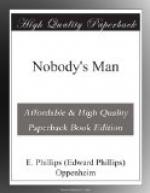“True enough,” she admitted, “but oughtn’t that to make one all the more careful? I loved seeing you when I came in, and I have loved our few minutes together, but I am getting a little nervous. Do you see that it is past two o’clock?”
“There is no one to whom you are accountable for anything in life except to me,” he told her passionately.
She laughed softly but a little uneasily.
“Dear Andrew,” she said, “there is my own sense of what is seemly and—must I use the horrid word?—my reputation to be considered. As it is, you may be seen leaving the house in the small hours of the morning.”
A little shiver passed through him. All the splendid warmth of living seemed to be fading away from his heart and thoughts. He was back again in that empty world of unreal persons. Jane had been a dream. This kindly faced, beautiful but anxious girl was not the Jane to whose arms he had come hotfoot through the streets.
“I ought not to have come,” he muttered.
“Dear, I don’t blame you in the least,” she answered, “only be very careful as you go out. If there is any one passing in the street, wait for a moment.”
“I understand,” he promised. “I will take the greatest care.”
He took up his hat and coat mechanically. She thrust her arm through his and led him to the door, looking furtively into his face as though afraid of what she might find there. Her own heart was beginning to beat faster. She was filled with a queer sense of failure.
“You are not angry with me, Andrew? You know that I have been happy to see you?”
“I am not angry,” he answered.
There was a little choking in her throat. She felt the rush of strange things. Her eyes sought his, filled with almost terrified anticipation. It chanced that he was looking away. She clenched her hands. His moment had passed.
“There is something else on your mind, Andrew, I know, but to-night we cannot talk any longer,” she said, in something resembling her old tone. “Be very careful, dear. To-morrow—you will come to-morrow.”
He walked down the hall with the footsteps of a cat, let himself out silently into the empty street and walked with leaden footsteps to his rooms. It was not until he had reached the seclusion of his study that the change came. A sudden dull fury burned in his heart. He poured himself out whisky and drank it neat. Then he seated himself before his desk and wrote. He did not once hesitate. He did not reread a single sentence. He dug up the anger and the bitterness from his heart and set them out in flaming phrases. A sort of lunacy drove him into the bitterest of extremes. His brain seemed fed with the inspiration of his suffering, fed with cruel epigrams and biting words. He dragged his idol down into the dust, scoffed at the piecemeal passion which measures its gifts, the complacency of an analysed virtue, the sense of well-living and




